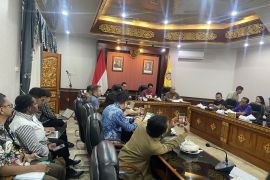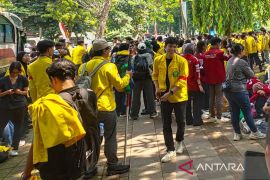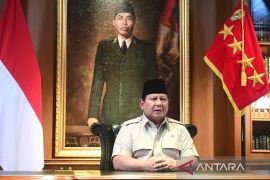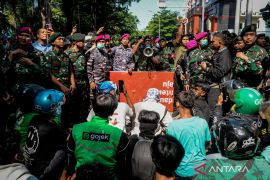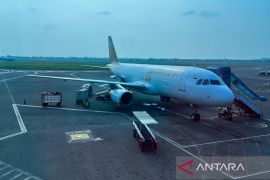During the Ottoman Caliphate era (1299-1924) in Turkey, the Sultan of Islam sent troops to the people in the archipelago, particularly to Aceh, in 1565 to support the local Sultanate against the Portuguese.
A long-standing relationship between the Sultan of Islam in Turkey with the leaders of the kingdoms in the archipelago was commented upon by the King of Yogyakarta, Sri Sultan HB X, at the 6th Congress of Indonesian Muslims in Yogyakarta.
"The Ottoman Sultan inaugurated Demak in 1479 as an official representative of the Ottoman Caliphate in Java," he said while giving a speech at the event that took place on February 8 - 11, 2015.
The inauguration, the Sultan said, was marked by the handing over of a green flag with Arabic words meaning, "There is no God but Allah." "The flag was kept at the Yogyakarta palace," he said.
According to him, the Sultan of Turkey inaugurated the King of Java, Raden Fatah, his representative in Java. "The representation of Ottoman in Java was marked by the handing over of a black flag with Arabic words, meaning, "There is no God but Allah," and a green flag with Arabic words meaning Prophet Muhammad," he said.
Sultan also said that in 1903, the Sultan of Turkey sent M Amin Bey who declared that Muslim rulers must not be subjected to the Netherlands.
After the Islamic Caliphate ended in 1924, the nationalism-based Turkish government recognized the independence of Indonesia on December 29, 1949.
The "modern" diplomatic relations between the two countries were marked by the opening of the Turkish Embassy in Jakarta on 10 April, 1957.
Until now, Indonesia and Turkey are able to foster relations in various sectors, including diplomacy, culture, economy and social.
The officials of the two countries have had exchange of visits.
In July 2015, President Joko Widodo (Jokowi) received Turkish President Recep Tayyip Erdogan and Mrs. Emine Erdogan at the State Palace, Jakarta.
Earlier, President Susilo Bambang Yudhoyono (SBY) undertook a state visit to Turkey for the first time after attending the G-20 meeting in Toronto, Canada in June 2010.
During his visit to Turkey, the president held a bilateral meeting and attended a signing ceremony of a memorandum of understanding, among others, on engineering and small and medium enterprises cooperation.
United
The coup against the Turkish government on July 15, 2016 showed the extent of hostility between two prominent Turkish figures, President Erdogan and Fethullah Gulen, who formerly were brothers in arms in ending secularism in the country.
Erdogan and Gulen see that secularism and such derivative ideologies as liberalism and permissiveness have been eroding Islamic values in society.
Secularism, which distances life from religious teachings, has resulted in marginalization of people in rural and remote areas by the elites who enjoy a western lifestyle.
Gulen has been living in exile in Pennsylvania, USA, since 1999, after he was accused of trying to overthrow Turkeys secular regime.
With both competing for control and power, the relationship between Erdogan and Gulen vanished.
Erdogans government has accused Fethulah Gulen as a figure behind the bloody coup, but the spiritual leader has rejected the allegation.
For Indonesia, the two leaders have great influences because Erdogan has been maintaining good relations with Indonesia in various fields.
Meanwhile, Fethullah Gulen has contributed at least in the field of education that has helped Indonesian students procure academic degrees.
Fethullah Gulen has built schools in several regions in Indonesia, such as Jakarta, Banjarmasin (South Kalimantan), Yogyakarta, Semarang (Central Java), Bandung (West Java), Tangerang (Banten), Aceh and Sragen (Central Java).
In addition, the charismatic cleric also gave an opportunity to the Indonesian youth to study in Turkey. Currently, there are about 3,000 Indonesians living in Turkey, most of them students in various disciplines.
The Turkish government had recently planned to close certain schools. However, the Indonesian government asked the Turkish government to respect the law in the country.
Indonesian Foreign Minister Retno Mersudi said the schools will continue to carry out teaching and learning activities. Retno said the Education Ministry has visited several schools whose closure was demanded by the Turkish government.
The feud between the two Turkish leaders, who were friends, is a matter of concern for Indonesia.
Shortly after the July 15 coup, Vice President Jusuf Kalla sent greetings to President Recep Tayyip Erdogan and conveyed a hope that the conflict will be quickly solved.
Brothers
Presumably, if the two leaders could be friends again, the country would go ahead and neighboring countries such as Indonesia could increase bilateral cooperation.
Many people of Indonesia and Turkey feel they are brothers to each other. Even cross-cultural marriages between two countries are common.
Some Turkish businessmen who have been to Indonesia many a times feel a high sense of brotherhood.
Considering their business partners in Indonesia are brothers, Istanbul exporters within the Association of Exporting Istanbul (IEA) appealed to the Indonesian government to facilitate their business affairs in Indonesia.
Chairman of the Turkish candy company of Elvan Group, Hidayet Kadiroglu, has visited Indonesia ten times, including Bali, Jakarta and several cities in Java. He does not feel strange in Indonesia. He said if the Istanbul businesses invest in Indonesia, they would not just make plans but would stay in the country.
"Because we are Muslim brothers, if necessary, I will stay in Indonesia to build offices and factories," Hidayet said.
Indeed, Gulen and Erdogan had a noble aspiration to restore the glory of Islam just as it was when Muslim elders lead all Muslims under the Ottoman Caliphate.
The spirit and idealism of these two Muslim leaders is a cause for strength in the Islamic world which is trying to re-build the civilization based on Sharia, thus advocating an ideological leadership, banishing secularism and liberalism which are prevalent among Muslims.
Uniting the power of Islam becomes particularly relevant at this time when 1.7 billion Muslims are separated by nation-states' boundaries that are vulnerable to conflict and hostility.
Hopefully, Gulen and Erdogan will remember that Prophet Muhammad (peace be upon him) once said that it is forbidden for Muslims to disconnect and be hostile and not speak to each other for more than three days.(*)
Reporter: Bambang Purwanto
Editor: Heru Purwanto
Copyright © ANTARA 2016

